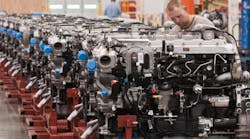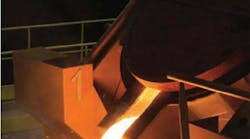The Steel Authority of India Ltd. (SAIL), a state-owned integrated steel organization, plans to relaunch its Kulti operations in the coming months. The Kulti Works, in the eastern region of India, has ferrous and nonferrous metalcasting capability, and supplies other SAIL operations with critical components. For example, products include blast furnace tuyeres, bosh plates, and phosphorous bronze slipper pads, among its nonferrous products; and cast steel pellet frames for sinter plants, gate bars, charging boxes, pig molds, alloy steel hammers, chilled steel rolls, and wheels, among its ferrous castings.
Kulti was the site where ironmaking was pioneered in India, by the Bengal Iron Works in 1870, using local iron resources in open top furnaces, and coal rather than charcoal (as had been used to produce steel in India for centuries.) Bengal Iron Works later became affiliated with the Indian Iron & Steel Co. (IISCO) and then a part of SAIL in 1972.
The Kulti Works was shut down in 2003, but now will be renamed the SAIL Growth Works, with M. Singh as its executive director.
According to the SAIL website, its Growth division manufactures and supplies a variety of spare parts and equipment to other SAIL plants, focusing on supplying the engineering shops of those operations.
Making the announcement on Christmas day, India’s Union Minister for Chemicals & Fertilizer and Steel, Ramvilas Paswan, stated: 'We are grateful to the Prime Minister and the Finance Minister who stood by us to give practical shape to our dream of brining a better life to Bengal.'
Paswan explained that the Kulti Works will be operational in about four months, beginning with the ferrous and nonferrous foundry operations. A detailed study was conducted in preparation for repairing and updating the operations.
Latest from Uncategorized
Latest from Uncategorized
Uncategorized
Newsletter Confirmation Page
May 27, 2013
Uncategorized
Vented Safety Helmet
July 21, 2012
Melt/Pour
A Plan Comes Together
July 5, 2012
Uncategorized
Convert Microscope to Videoscope
July 2, 2012
Uncategorized
Robot Programming with Tablet-PC
July 2, 2012



